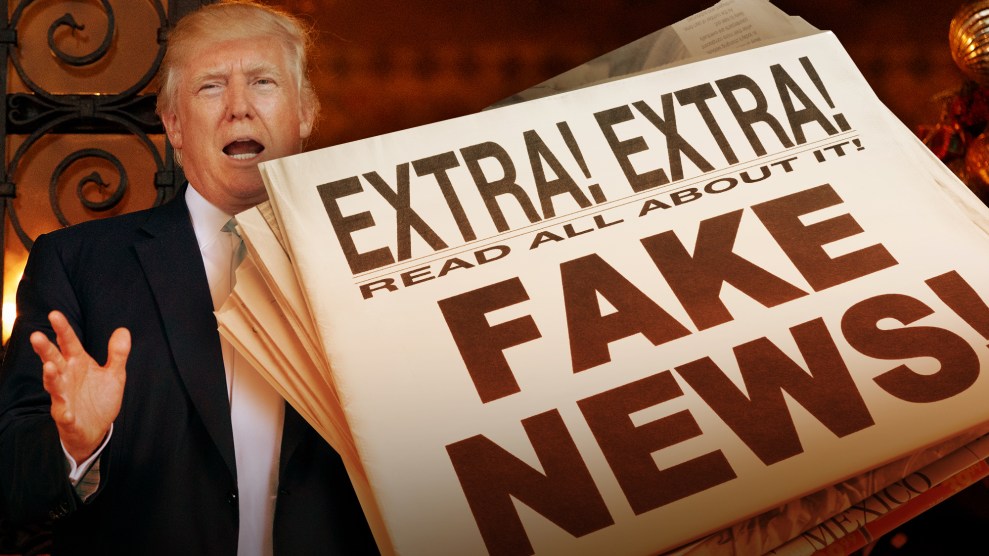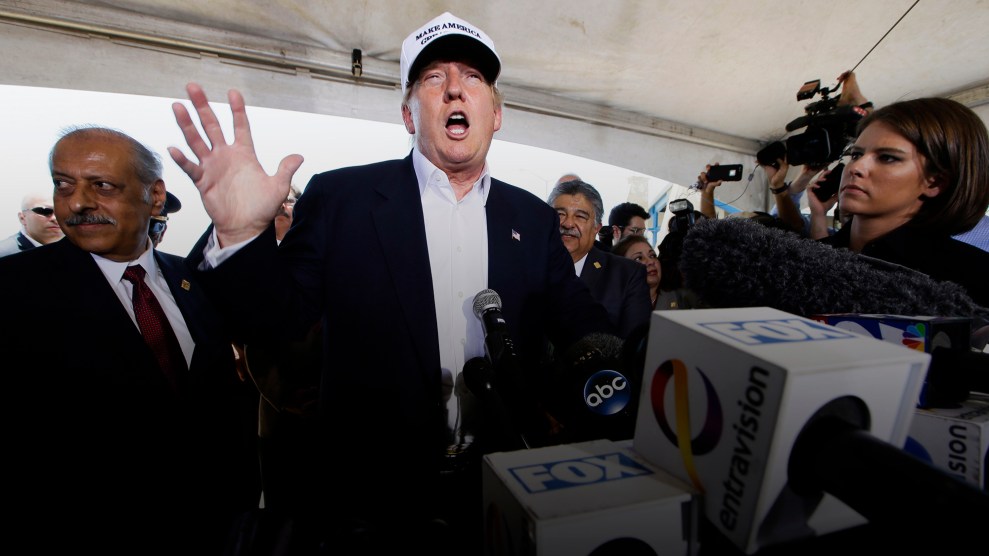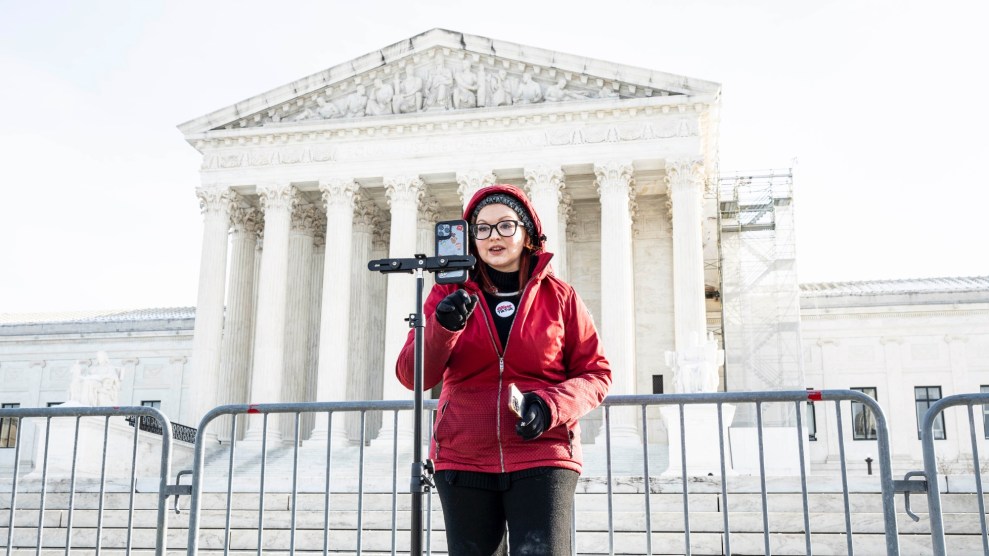“They may not be ready for the Ku Klux Klan yet, but as anti-white hatred escalates, they will.”
That was Rachel Pendergraft, a spokeswoman for the political arm of the Ku Klux Klan (yes, this exists), talking last year about the way the Trump campaign was helping racist and white supremacist groups reach a growing audience. Mother Jones interviewed her as part of a big investigation, which found that these extremists were seeing Trump as legitimizing their once-hidden views.
Hearing people like Pendergraft talking this way—taking off the hood, as it were—was shocking enough. But here’s what really stunned us in reporting out that story: Not only were extremists excited by Trump’s campaign. Not only were they using it to recruit on a scale they hadn’t imagined before. They felt that the campaign was signaling to them actively and deliberately—and the more we dug, the more we realized they were right.
This was a chilling discovery, and it is even more so now. The story of this moment is not just what Trump is saying, or failing to say, about white supremacist violence. It is that his words and actions, from Charlottesville to Deferred Action for Childhood Arrivals (DACA), follow a well-established pattern of support for their causes that is neither random nor impulsive. It can, at this point, only be read as deliberate.
This is a critical issue, one that is still underrecognized and underinvestigated. We’ve been digging hard on this beat for more than a year, and now that what once dwelled in the backwaters of the internet has been laid bare in the streets, we’ve been asking ourselves what role journalism, and Mother Jones in particular, needs to play in fighting Nazis, white supremacists, and authoritarians.
One answer: Call it out. We aim to double down on exposing the rise of hate groups and their links to the White House, and we’ll also shine a spotlight on the racism that doesn’t carry a torch. We’ve committed to dedicating a team of reporters to this critical issue. It’s one that an independent, reader-supported newsroom like Mother Jones can tackle without being intimidated, and we hope readers like you will help us do it.
But before we make that case, let’s go back to the time, well before the election, when Trump’s unique pattern of giving comfort to extremists began to emerge. Way back in May 2016, our reporter Josh Harkinson was writing about a guy named William Johnson. He was the head of the American Freedom Party, which the Southern Poverty Law Center considered “the most important white nationalist group in America.” With the Trump campaign getting traction, groups like the AFP were feeling frisky. Johnson, who has published a book arguing for the deportation of all nonwhite people, spent some $18,000 of his own money on pro-Trump robocalls in key states. They said things like “The white race is dying out in America and Europe because we are afraid to be called ‘racist.'”
This was alarming, but politics always attracts some crazies, and you can’t necessarily blame a campaign for its most extreme supporters. But then Josh discovered that the Trump campaign had actually selected Johnson as one of Trump’s delegates for the Republican convention. Johnson fully understood what that meant: a chance to “show how I can be mainstream and have these views,” as he told Josh. “I can be a white nationalist…and be a good example to everybody.”
Only after the story was published (and got a lot of attention) did the campaign respond. It claimed it had actually rejected Johnson months earlier and that he’d slipped in thanks to a “database error.” Never mind that Josh had emails in which the campaign had congratulated Johnson on his selection as a delegate, just hours before our story was published.
There was the pattern. Signal to the extremists; deny it when forced to, but with a transparently meaningless excuse; wait for the media to move on; leave the extremists reassured that you didn’t really mean it.
We got to know this pattern all too well as we covered white nationalism throughout election season. We analyzed Twitter data to connect the dots between Trump and racist accounts, exposed the likes of Richard Spencer and Steve Bannon before they were household names, and documented myriad Trump endorsements from prominent white supremacists.
The same pattern played out over and over again. The campaign consistently refused to disavow the extremists, even as it also promoted their memes (as when Trump retweeted a graphic from a white supremacist falsely claiming that 81 percent of white homicide victims were killed by black people). When Trump retweeted the account @WhiteGenocideTM, the publisher of the neo-Nazi Daily Stormer could barely contain his excitement. “Our Glorious Leader and ULTIMATE SAVIOR has gone full-wink-wink-wink to his most aggressive supporters,” he wrote. “Whereas the odd White genocide tweet could be a random occurrence, it isn’t statistically possible that two of them back to back could be a random occurrence. It could only be deliberate.”
And the pattern persisted after Trump won the presidency. When he refused to call out Nazis and white supremacists even after a domestic terrorist maimed dozens in Charlottesville, Virginia—and then averred that “very fine people” were marching under Confederate flags—the extremists recognized the signal. When, only a week later, he pardoned Joe Arpaio—a man whom white supremacists had made a cause célèbre—they saw him in their corner again. When Attorney General Jeff Sessions announced that the administration was bringing the hammer down on the DACA program, he cited two lies popular among far-right nativists: That “Dreamers” take jobs away from Americans, and that the program prompted the surge in unaccompanied child immigrants (who, for the record, are not eligible for DACA status).
Here’s what reporters Sarah Posner and Dave Neiwert concluded in their investigation last year, published nearly a month before the election:
The GOP nominee, along with his family members, staffers, and surrogates, has provided an unprecedented platform for the ideas and rhetoric of far-right extremists, extending their reach. And when challenged on it by the press, Trump has stalled, feigned ignorance, or deflected—but has never specifically rejected any of these other extremists or their ideas.
“The success of the Trump campaign just proves that our views resonate with millions,” [Rachel Pendergraft of David Duke’s Knights Party] told us. “They may not be ready for the Ku Klux Klan yet, but as anti-white hatred escalates, they will.”
Fascists and authoritarians have always counted on mainstream figures legitimizing them. (Political scientists talk about moving the “Overton window” of what constitutes acceptable discourse.) They know their actual views are repulsive to much of the public, so they rely on what Lenin called “useful idiots” to carry their water.
And they rely, too, on the press failing to recognize the threat. The racist far right bets that journalists will continue treating them as fringe nuts, or even give them the legitimacy of the he-said-she-said treatment: How, even after the terror events of Charlottesville, did CNN manage to publish a story identifying Richard Spencer as a “white rights activist“? How, in the initial reports from that bone-chilling torch rally, was it never pointed out that “blood and soil” was an actual Hitler rallying cry?
Yes, there’s the argument that it’s best to ignore the hatemongers—but the evidence on that is not encouraging. All through 2016, much of the media did largely ignore the racist and white supremacist elements of Trump’s movement, and they did not go away. They got stronger.
At this point, the answer is not to look the other way: It’s to expose them. And that’s what we’re committed to do. Because we’re reader-supported, we can take on dangerous, difficult stories that might not pay for themselves with advertising revenue alone—and stick with them for however long it takes. If you agree that this kind of reporting should happen, please help us do it with a tax-deductible monthly or one-time donation.
Right now, we need to deploy the expertise and experience we’ve gained reporting on the far right to find out what Steve Bannon (who reportedly met with billionaire Robert Mercer before being fired from the White House) is up to next; how extremists are leveraging their moment in the spotlight to gain followers (often by targeting kids); and what organizers, teachers, parents, and others are doing to overwhelm their propaganda with messages of fact, and of love.
As for the “racism that doesn’t carry a torch” part: On the same day that Trump defended Nazis, a court in Texas ruled—for the seventh time!—that state Republicans had passed laws intended to keep people of color from voting. Those laws are still in place, still shaping elections in cities and states, and probably had a big part in the 2016 results as well. One of the newest additions to our newsroom, Ari Berman, is deeply steeped in this issue, and he’ll investigate voter suppression and its enablers.
There are many people working to send white supremacists crawling back to their lair. There are the University of Virginia students who faced down torch-bearing radicals in Charlottesville, the clergy who locked arms and knelt in the face of armed militias, the African American cops who protected racists’ First Amendment rights. And there are also those of you who do your part, in word and deed, to defend a vigorous, independent press when it’s needed most. It’s an incredible honor to have so many active, committed people among our readers, and we’d love to hear your thoughts on what journalists—and everyone—can do to push back against extremism. Please share them in the comments.
Normally, we’d start our annual fall fundraising campaign right now—we’d pick a theme and repeat, “We need to raise $200,000 by September 30,” until we’re blue in the face. And we do need to raise that money, urgently. But we also need to throw everything we can at covering the rise of white supremacy. So instead of relying on an artificial goal and deadline, we’re going to bet that the work we plan to do, and the urgency of the moment, are all the motivation you’ll need. Just like our reporting, we’ll lay out the facts and let you take it from there.
If you’re ready to commit to a monthly gift at an amount that works for you, that’s the most effective way you can help, because it gives us the stability needed to invest in our reporting by hiring more journalists—if we can earn $20,000 more in monthly donations, that will be enough to build out a dedicated team to stay on this beat for the long haul. As always, we’d be grateful for your one-time donations, too—or for that matter, you can buy a shirt or mug embodying our namesake’s most famous pronouncement: Pray for the dead and fight like hell for the living.
Because that’s what we all need to do: Fight like hell.
KKK: Boston Globe/Getty Images; Charlottesville: Zach D Roberts/NurPhoto/ZUMA.
















